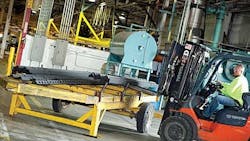Wabash National's endangered species
AS PART OF RECENT REVISIONS to its Lafayette manufacturing plant, the trailer manufacturer was able to reduce the daily distance that forklifts must travel by 153 miles per operating shift.
The key: converting newly freed up production space into warehouse space and by consolidating 10 scattered warehouses into one central location.
“We were able to eliminate Lines 3, 4, and 5 and move that production to Lines 1 and 2,” Giromini says. “This freed up almost 200,000 square feet of production space. That has enabled us to use the space to store parts and materials closer to where they are needed on the assembly line. A lot of redundant material handling has been eliminated.”
Yes, but doesn't this reduce manufacturing capacity? Yes, but…
“Before the transformation, we had the capacity to build 100,000 trailers per year,” Giromini says. “That's great, except we have never built 100,000 trailers in a year. The entire industry has only produced more than 300,000 one time, in 1999. So, we had excess capacity we were unlikely to use.”
“Even with the reduction in capacity, we still can produce 65,000 trailers per year in Lafayette — and we aren't sure that we would want to build even that many. That's a rate that can't really be sustained. We would much rather maintain production at a fairly constant level and be better able to optimize our facilities.”
